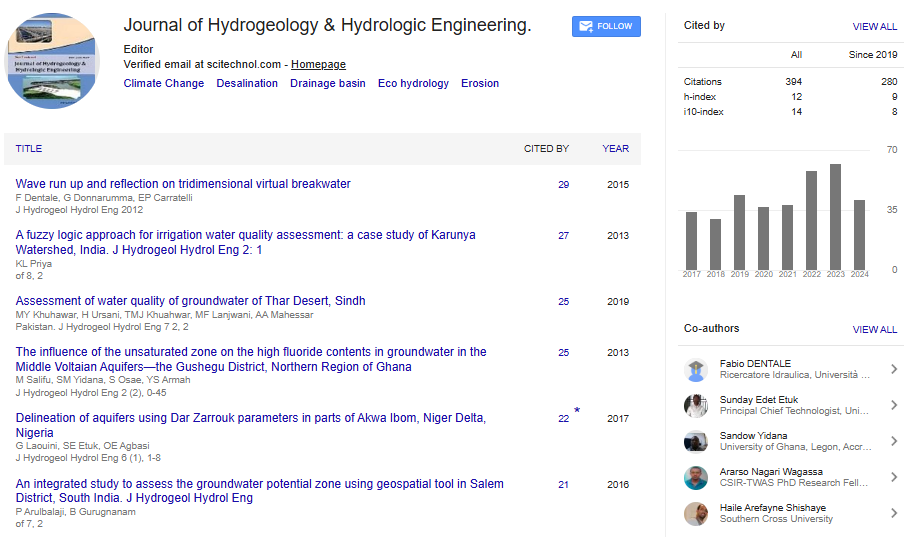Perspective, J Hydrogeol Hydrol Eng Vol: 13 Issue: 5
Hydrogeology: The Science of Groundwater and Its Environmental Significance
Emily Watson*
1Department of Hydrologic Engineering, Indian Institute of Technology Bombay, Mumbai, India
*Corresponding Author: Emily Watson,
Department of Hydrologic Engineering, Indian
Institute of Technology Bombay, Mumbai, India
E-mail: watsone46@gmail.com
Received date: 23 September, 2024, Manuscript No. JHHE-24-153105;
Editor assigned date: 25 September, 2024, PreQC No. JHHE-24-153105 (PQ);
Reviewed date: 09 October, 2024, QC No. JHHE-24-153105;
Revised date: 16 October, 2024, Manuscript No. JHHE-24-153105 (R);
Published date: 24 October, 2024, DOI: 10.4172/2325-9647.1000341
Citation: Watson E (2024) Hydrogeology: The Science of Groundwater and its Environmental Significance. J Hydrogeol Hydrol Eng 13:5.
Description
Hydrogeology, a specialized field within the geosciences, focuses on the study of groundwater its occurrence, movement and distribution within the Earth's crust. Groundwater plays an essential role in maintaining ecosystems, supporting agricultural activities and meeting the water needs of human populations. As freshwater resources face increasing pressures from urbanization, climate change and industrial demand, understanding hydrogeology is essential for effective water management and sustainable use. This article investigates into the principles of hydrogeology, the methods used in the field and its importance in addressing environmental and societal challenges.
At its core, hydrogeology examines how water interacts with geological materials, such as soils and rock formations. Groundwater is stored in aquifers-underground layers of permeable rock, sediment, or soil capable of holding and transmitting water. Aquifers are classified as confined or unconfined, depending on the presence of an overlying impermeable layer. In confined aquifers, groundwater is under pressure due to this impermeable barrier, while unconfined aquifers lack such a barrier and are often more vulnerable to contamination from surface activities.
Hydrogeologists study the processes governing the recharge and discharge of groundwater. Recharge occurs when precipitation, rivers, or lakes percolate through the soil and reach the water table, replenishing aquifers. Discharge happens when groundwater flows to the surface, feeding springs, rivers and wetlands. Understanding these processes helps hydrogeologists predict groundwater availability, identify areas susceptible to contamination and ensure the long-term sustainability of water resources.
Hydrogeologists use a range of techniques to study groundwater systems. Groundwater modeling is a primary method, using mathematical simulations to predict the flow and behavior of water through aquifers. These models help forecast the impacts of pumping, pollution and natural changes on groundwater resources. Field studies and monitoring programs are also essential, as they provide data on water quality, aquifer properties and changes in the water table over time.
Another precarious aspect of hydrogeology is hydrochemistry, which investigates the chemical composition of groundwater. By analyzing mineral content and potential contaminants, hydrogeologists can assess the quality of groundwater and detect potential hazards such as arsenic or nitrate contamination. Remote sensing and geophysical techniques, such as electrical resistivity tomography and seismic surveys, offer non-invasive ways to gather information about subsurface structures and water distribution.
Hydrogeology is integral to a variety of applications that have direct implications for society and the environment. One of the most precarious applications is in groundwater management, where hydrogeologists work with policymakers to develop sustainable extraction plans. Over-pumping of groundwater, often for agricultural or urban supply, can lead to depletion of aquifers, land subsidence and saltwater intrusion in coastal regions. By providing scientific data and recommendations, hydrogeologists help balance the demand for water with the need to preserve groundwater reserves.
Hydrogeology also plays an essential role in environmental protection. Contaminants from industrial, agricultural and urban sources can seep into aquifers, threatening water quality and public health. Hydrogeologists assess contamination risks and devise remediation strategies to protect aquifers from pollutants. They may work on projects involving wastewater disposal, landfill site selection and cleanup of hazardous waste, all of which require a solid understanding of how water moves and interacts within the subsurface.
In the context of climate change, hydrogeology provides valuable insights into the flexibility of groundwater resources. Changes in precipitation patterns, rising temperatures and extreme weather events can all affect groundwater recharge rates and demand. Hydrogeologists study these impacts, helping communities adapt to changing water availability and prepare for droughts or floods that could compromise water supply.
Conclusion
Hydrogeology is an essential discipline that addresses some of the most pressing water-related issues facing our world today. By studying groundwater systems, hydrogeologists contribute to sustainable water management, environmental protection and climate resilience. As challenges surrounding water scarcity, contamination and ecosystem preservation grow, the role of hydrogeology will continue to be pivotal. Investing in hydrogeological research and applying its principles are key to ensuring that groundwater remains a reliable resource for future generations. Understanding hydrogeology not only enhances our grip of Earth's natural processes but also enables us to make informed decisions for the well-being of our planet and society.
 Spanish
Spanish  Chinese
Chinese  Russian
Russian  German
German  French
French  Japanese
Japanese  Portuguese
Portuguese  Hindi
Hindi 
